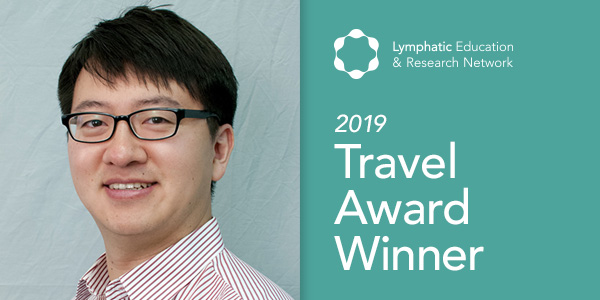Hyun Min Jung, currently a Postdoctoral Fellow at the Division of Developmental Biology at the National Institutes of Health, under the supervision of Dr. Brant Weinstein, received a Travel Award from LE&RN to attend the Lymphatic Forum in Austin, TX. We asked Hyun Min to share his thoughts on that experience with us and to tell us a bit about his research and future plans.
What did you get out of the Lymphatic Forum? Why did you feel it was important to attend?
As an attendee for both the first (Chicago, 2017) and second (Austin, 2019) Forum, I feel the Lymphatic Forum is a fantastic conference that brings scientists, clinicians, and patients all together to advance our understanding of the lymphatic system. I would like to thank LE&RN for the Travel Award and their continuous support for the Lymphatic Forum. Through this conference, I learned a lot about the most recent advances in lymphatic research. It was also great to hear the stories from the patients and family, and it was exciting to meet colleagues, collaborators, and new people! Lymphatic Forum provides a great opportunity to facilitate lymphatic research by creating a positive, constructive, and multidisciplinary research community. I plan to continue attending the future Lymphatic Forums.
What are your areas of interest in research?
Taking advantage of high-resolution live imaging and various transgenic resources using zebrafish as a model organism, I like to identify new lymphatic vessels/structures, study their developmental processes, and examine gene regulation required for this process. I am also interested in developing transgenic tools to identify novel players in lymphatics. Using these novel tools, I am identifying lymphatic microRNAs and studying how they regulate downstream targets during lymphatic vessel development.
What are your hopes and plans for your career and your research?
I would like become an independent investigator focusing on gene regulation in lymphatics by identifying novel players and understand their role in lymphatic development and disease. We need to advance our knowledge in basic biology of lymphatic vessels, which is necessary to better understand lymphatic diseases and to develop effective treatment options.
Why do you believe that, in general, lymphatic research is important? What might the field accomplish within the next few years?
Thanks to many discoveries made by lymphatic researchers, we are gaining evidence that many serious health problems such as lymphedema, cancer, obesity, diabetes, inflammatory diseases are linked to lymphatic problems. I hope we, as a scientific community, will continue putting efforts together to understand lymphatics better and develop novel treatments to manage these health problems.
LE&RN programs, like LE&RN Travel Awards, are only possible because of our Partners and Supporting Members. Become a Supporting Member today.

